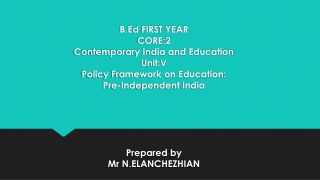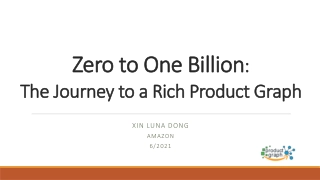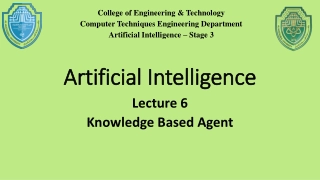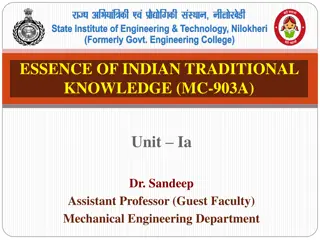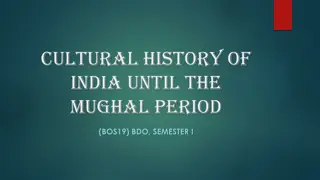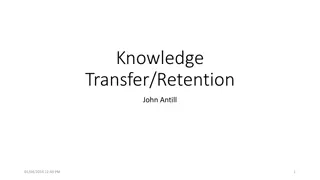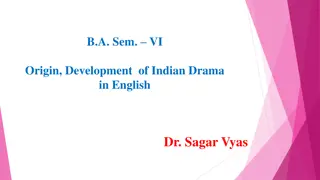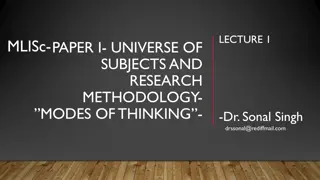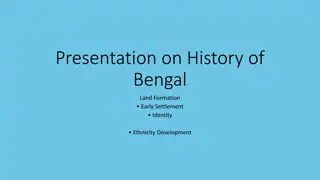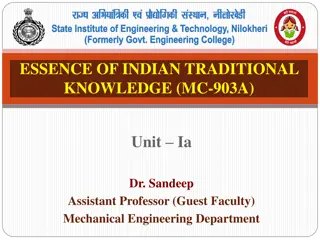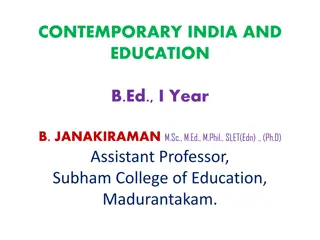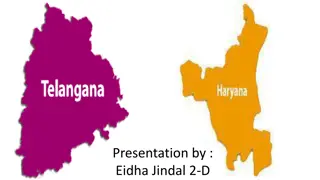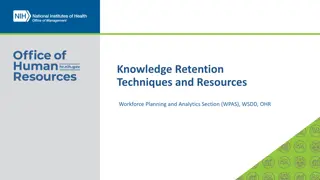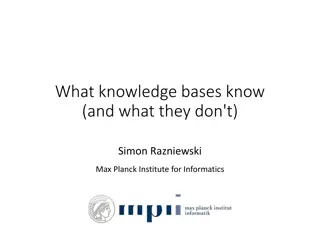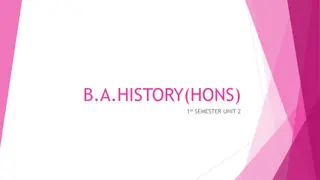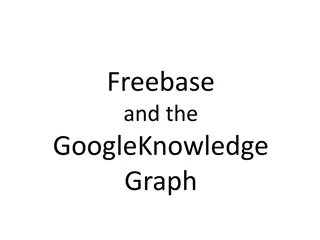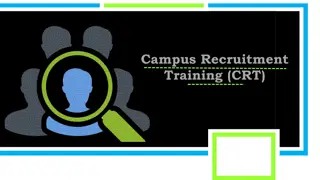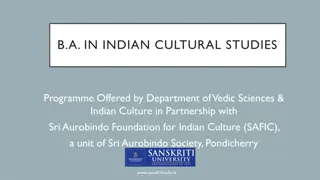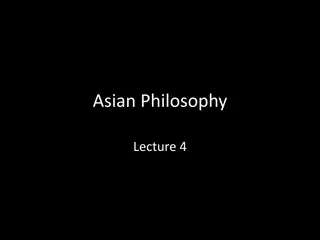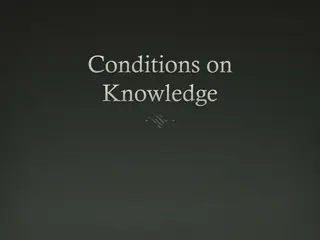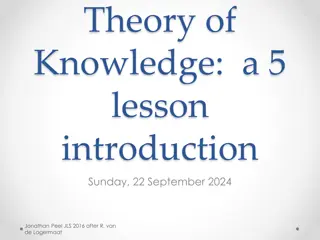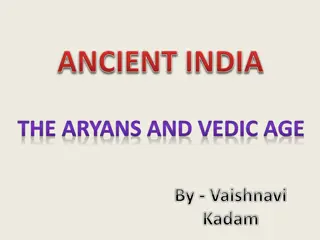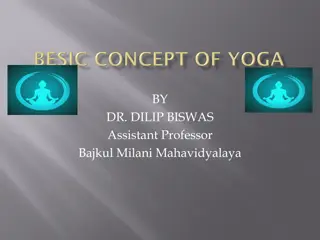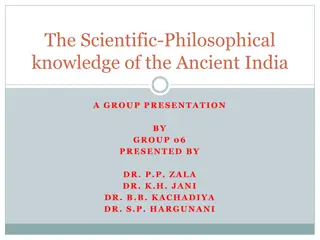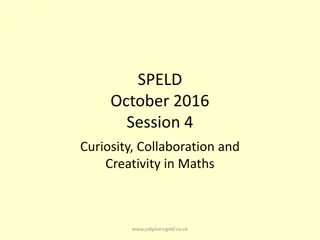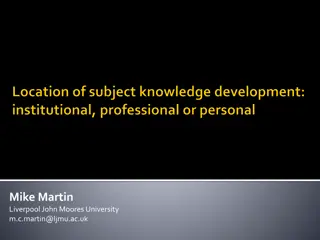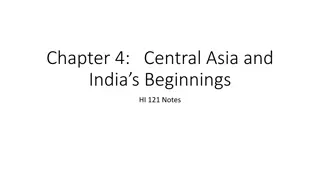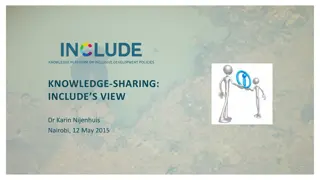Education in Ancient India: Vedic System Overview
The history of education in ancient India traces back to the Vedic system, rooted in the Vedas and emphasizing self-realization and liberation. The curriculum included Vedic literature, arithmetic, geometry, and spiritual studies, fostering academic freedom and discipline among students.
0 views • 9 slides
Women and Education
Women's education in India has evolved over time, from the Vedic period to colonial India. Despite challenges faced in medieval times, efforts have been made to empower women through various forms of education. Education plays a crucial role in shaping the future of women and society as a whole, pro
0 views • 15 slides
Knowledge Capture
Knowledge capture is crucial for organizations to retain valuable expertise and prevent loss of critical knowledge due to employee turnover. Tacit and explicit knowledge play key roles, requiring strategic planning for retention, incentivizing knowledge-sharing culture, and implementing effective st
0 views • 6 slides
Exploring Product and Knowledge Graphs for Enhanced Information Retrieval
Dive into the world of product and knowledge graphs, uncovering the journey to a rich product graph, examples of knowledge graphs for songs, and the mission to provide comprehensive information on products and related knowledge. Discover use cases ranging from information provision to enhancing sear
3 views • 76 slides
Understanding Knowledge-Based Agents in Artificial Intelligence
Knowledge-Based Agents in AI utilize logic and knowledge representation to accept tasks, learn, and adapt to changing environments. Logic plays a crucial role in forming complex world representations and deriving actions based on inference. The central component is the Knowledge Base (KB), represent
4 views • 19 slides
Understanding Knowledge Management: Processes and Frameworks 2. In knowledge management, organizations create, share, and manage knowledge to enhance performance. It involves acquiring different types of knowledge through various means, such as perc
Knowledge Management, Organizational Objectives, Types of Knowledge, Tacit Knowledge, Explicit Knowledge
1 views • 17 slides
The Essence of Indian Traditional Knowledge: Vedic Culture and History
The Vedas, ancient religious texts of Hinduism, provide essential knowledge about existence and the divine. Believed to have always existed, they were orally transmitted before being written down between 1500-500 BCE in India. The Vedas are considered among the oldest religious works and are categor
1 views • 41 slides
Administration: Ancient, Medieval and colonial
The evolution of administration in India traces back to the earliest monarchial systems in the Vedic period, progressing through texts like Arthshastra and principles of hierarchy. Ancient administrators emphasized decentralization and hierarchical structures. Arthshastra acted as a manual for admin
2 views • 17 slides
Features of Jainism: An Overview Presented by Debajit Hazarika, Assistant Professor
Jainism is an ancient non-Vedic religion with roots tracing back to the times of the Indus Valley Civilization. It emphasizes non-violence, self-conquest, and spiritual liberation through 24 Tirthankaras, with Lord Mahavira being the most significant. Jainism stands out with its rejection of caste d
1 views • 7 slides
Pedagogical Shift in Physical Science: Constructing Knowledge Through Learner-Centered Experiences
There is a significant pedagogical shift in physical science education from viewing science as a fixed body of knowledge to emphasizing the process of constructing knowledge. Learners are now placed at the center stage, engaging in inquiry-based learning, critical thinking, and collaborative interac
3 views • 21 slides
Cultural History of India: Early Vedic Period and Aryans
The period of the Aryans in ancient India marked a transition from the Indus Valley Civilization to the Vedic Civilization. The Aryans, possibly migrants from various regions, integrated with the indigenous Dravidians to form the Vedic society. Their culture, as depicted in the Vedas and epics like
0 views • 10 slides
Importance of Knowledge Retention in Organizations
Organizations face negative impacts on performance due to the loss of knowledge. Strategies such as exit interviews, mentorship, and knowledge sharing tools are vital for effective knowledge retention. Assessing knowledge retention maturity through various techniques is crucial, aligning with ISO st
0 views • 11 slides
Origin and Development of Indian Drama in English
Indian English Drama has a rich history, starting from the Sanskrit plays of the Vedic Age to prominent playwrights like Rabindranath Tagore and Sri Aurobindo Ghosh. The genre saw a resurgence in the 20th century with significant contributions from various playwrights marking its evolution through s
0 views • 8 slides
Understanding Modes of Thinking and Knowledge Development
Man's acquisition of knowledge is intricately linked to his ability to think, reason, and perceive. Knowledge is a result of experiences gained through perception, intellect, and intuition. The history of humanity is a story of knowledge acquisition and development, with man at the forefront as the
1 views • 18 slides
Historical Evolution of Bengal: Land Formation & Cultural Development
Ancient Bengal, known as Vanga, witnessed territorial evolution from early Vedic literature to political prominence under different dynasties like Palas and Guptas. The region's history reflects a rich tapestry of cultural change, ethnic identity, and settlement pattern, especially during Buddhist p
0 views • 10 slides
Essence of Indian Traditional Knowledge: Vedic Culture and the Vedas
The Vedas, ancient religious texts of Hinduism, are considered among the oldest in the world, passed down orally before being written in the Vedic Period in India. They contain knowledge about existence, not revealed at a specific historical moment but perceived by sages through deep meditation.
0 views • 41 slides
Vedic Education System in Contemporary India: A Historical Overview
Explore the roots of education in pre-independent India, focusing on the Vedic system with its objectives, curriculum, and Gurukula education model. Learn about the teacher-student relationship and the central role of the teacher in shaping learners' lives. Discover the spiritual and intellectual de
0 views • 22 slides
Rich Culture and Gastronomic Delights of Telangana and Haryana
Explore the vibrant cultural heritage of Telangana, boasting a history of 5,000 years, while savoring its spicier cuisine and traditional attire. Delve into Haryana's mystical charm, steeped in Vedic traditions, and relish its authentic dishes like Bajra Aloo Roti and Kachri Ki Chutney.
0 views • 12 slides
Effective Knowledge Retention Strategies in Workforce Planning and Analytics
Retaining knowledge is crucial for organizations to enhance customer service, foster innovation, improve efficiency, and bridge skill gaps. This article explores the significance of knowledge retention, the types of knowledge essential for succession planning, and two effective strategies - the Know
1 views • 10 slides
Exploring Knowledge Base Construction and Commonsense Knowledge in Fiction
Delve into innovative research interests focusing on knowledge base construction using fictional texts as archetypes, taxonomies for constructing knowledge bases, and extraction of commonsense knowledge from diverse sources. Challenges such as sparsity and semantics are addressed through comprehensi
3 views • 48 slides
Knowledge Transfer Toolkit for Organizational Success
This toolkit, developed by the Commonwealth of Virginia DHRM in June 2020, covers the essentials of knowledge transfer, including its definition, impact, challenges, and management strategies. It emphasizes aligning knowledge transfer with strategic goals, overcoming barriers through leadership supp
2 views • 15 slides
Rise of Janapadas and Mahajanapadas in Vedic India
The rise of Janapadas and Mahajanapadas marked a significant transition in the political landscape of Vedic India. Janapadas, major kingdoms of that era, evolved into more powerful Mahajanapadas through territorial expansion and urbanization. The shift from tribal polities to territorial states led
0 views • 9 slides
Evolution of Freebase and the Google Knowledge Graph
Freebase was initially created in 2005 as an open shared database of knowledge, later acquired by Google and absorbed into the Google Knowledge Graph. Its approach included crowdsourcing updates and additions, focusing on data rather than text. The schema of Freebase included around 1500 types, 3500
1 views • 12 slides
Comprehensive Campus Recruitment Training (CRT) Program
Enhance your skills with our Campus Recruitment Training (CRT) program covering various topics such as aptitude tests, Vedic Mathematics, verbal reasoning, logical deductions, and more. Access study materials, online mocks, and hands-on sessions to prepare for company-specific interviews and tests.
0 views • 11 slides
Education in Ancient India: Vedic System Overview
Education in ancient India began with teaching traditional elements like Indian religions, mathematics, and logic. The Vedic system of education was based on the Vedas, focusing on spiritual and materialistic knowledge. The ultimate aim was self-realization and liberation of the soul. The curriculum
0 views • 9 slides
B.A. in Indian Cultural Studies Programme by Department of Vedic Sciences & Indian Culture
Explore the B.A. in Indian Cultural Studies programme offered by the Department of Vedic Sciences & Indian Culture in partnership with Sri Aurobindo Foundation for Indian Culture. Delve deeper into the spiritual foundations, history, and key contributions of Indian civilization while preparing for a
0 views • 13 slides
Traditional Food Practices and Beliefs in India, Pakistan, and Bangladesh
Explore the historical background and traditional beliefs surrounding Indian, Pakistani, and Bangladeshi foods. Discover the differences in religious practices, the influence of Vedic scriptures on food choices, and the categorization of foods into Sattvic, Rajasic, and Tamasic categories based on t
1 views • 29 slides
The Two Trends of Indian Philosophy: Naturalism vs. Spiritualism
Indian philosophy is characterized by two dominant trends - naturalism/materialism and spiritualism/theism. The Charvaka school represents the naturalistic perspective, rejecting Vedic authority and advocating for materialism. They emphasize perception as the sole source of knowledge and deny concep
0 views • 15 slides
Exploring Epistemology: Understanding Knowledge and Truth
Epistemology delves into the nature of knowledge, understanding, wisdom, and justification, questioning the extent of human knowledge and the different kinds of knowledge. It explores skepticism and conditions on propositional knowledge, discussing whether knowledge implies truth and the debate betw
1 views • 54 slides
Navigating the World of Big Data, Knowledge, and Crowdsourcing
The world has evolved into a data-centric landscape where managing massive amounts of data requires the convergence of big data, big knowledge, and big crowd technologies. This transformation necessitates the utilization of domain knowledge, building knowledge bases, and integrating human input thro
1 views • 5 slides
Exploring the Nature of Knowledge in Theory of Knowledge
Delve into the essence of knowledge with Jonathan Peel's introduction to Theory of Knowledge, pondering on how different disciplines perceive knowledge, the impact of empirical questioning, and timeless wisdom on ignorance and progress. Explore the concept of basic knowledge and its implications, in
0 views • 37 slides
The Aryans and Vedic Age - An Overview of Early and Later Vedic Periods
The Aryans, believed to have originated from Central Asia, played a significant role in shaping the Vedic Age in ancient India. This period saw the emergence of key political, economic, and religious developments, contributing to the foundation of Hinduism. From the Early Vedic Period characterized
0 views • 19 slides
Understanding the Paths of Yoga: Karma, Bhakti, Gyana, Raj, and Hatha Yoga
Yoga, originating from Vedic scriptures, offers paths like Karma, Bhakti, Gyana, Raj, and Hatha Yoga to attain the ultimate reality. Each path focuses on different aspects such as action, devotion, knowledge, and physical practice, leading to a holistic development of the mind and body.
0 views • 11 slides
Understanding Modelling Knowledge and Knowledge Representation
Explore the significance of modelling knowledge through knowledge representation, making it explicit, independent, and reusable. Learn why knowledge representation is essential and how it facilitates exchange, query, inference, and visualization. Delve into examples of knowledge application in vario
0 views • 30 slides
Ancient Indian Scientific and Philosophical Knowledge: A Remarkable Insight
Explore the profound scientific and philosophical insights of ancient India as presented by Group 06 with a focus on remarkable achievements like the velocity of light, the Big Bang theory, Vedic astronomy, and concepts such as the heliocentric solar system. Dive into ancient texts like the Rig-Veda
0 views • 22 slides
Exploring Curiosity and Creativity in Mathematics
Delve into the fascinating world of mathematics through the lens of curiosity, collaboration, and creativity. Uncover the impact of curiosity on memory, the magic of mathematics explained by Bharati Krishna, and intriguing Vedic math techniques. Discover the art of proposing questions in mathematics
0 views • 58 slides
Certificate Courses in Indian Cultural Studies by Department of Vedic Sciences & Indian Culture
Explore month-long certificate courses in Indian Cultural Studies offered by the Department of Vedic Sciences & Indian Culture in collaboration with Sri Aurobindo Foundation for Indian Culture. Delve into India's rich cultural heritage to gain insights into ancient wisdom traditions, prepare for con
0 views • 8 slides
Understanding Subject Knowledge Development in Education
Exploring the complexities of subject knowledge development in education, this study delves into areas such as students' existing knowledge, competencies, and the role of institutions in shaping knowledge acquisition. The focus lies on personalizing knowledge to individual needs rather than a fixed
1 views • 22 slides
Early Civilizations and Trade Networks in Central Asia and India
The chapter explores the Indus Valley Civilization, early trade routes, and urbanized societies like Mohenjo-Daro and Harappa in India. It delves into the significance of Central Asia's steppe lands, the Vedic Epoch, and the cultural developments in the region during ancient times.
0 views • 19 slides
Knowledge Sharing and Inclusive Development Policies
Knowledge Platform on Inclusive Development Policies (INCLUDE) focuses on enhancing research utilization in policy-making to foster more inclusive development. It was established in 2012 with the aim of bridging the gap between research and policy processes in African countries. INCLUDE engages expe
0 views • 8 slides
